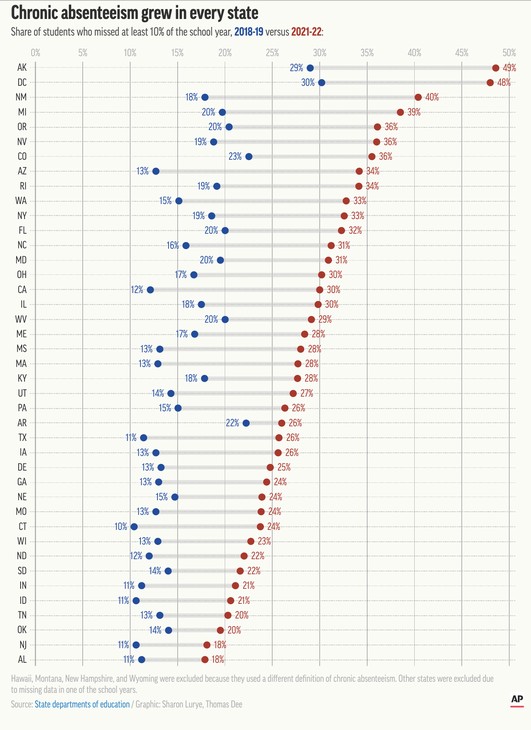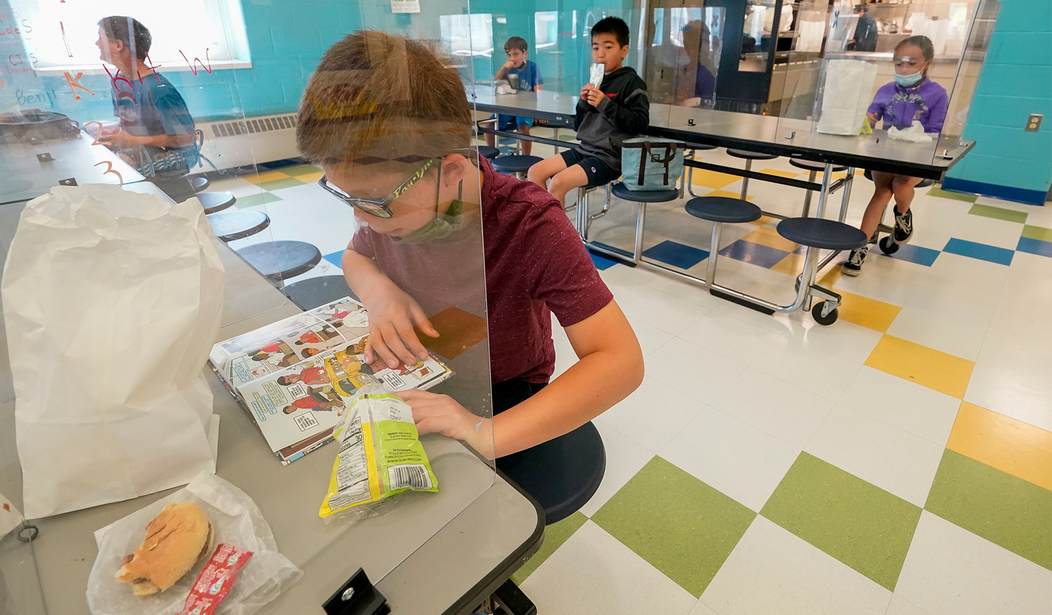By now it is abundantly clear that school closures were a horrible idea. Study after study show that closing schools did little to nothing to slow the spread of COVID and that the costs to kids were astronomical.
Kids lost the opportunity to learn in school, their mental health deteriorated, and the teachers and administrators were radicalized as they lost focus on doing the day-to-day work of instructing students, and students themselves lost the habit of going to school and doing the work necessary to keep up with classwork.
Now research is showing what everybody who gave a moment’s thought would be likely: the damage done to students is permanent.
Chronic absences have soared in U.S. schools since the pandemic. All told, 6.5 million additional students have missed at least 10% of the school year, according to a new analysis by @Stanford in partnership with @AP. https://t.co/XPDu8VcTiY
— The Associated Press (@AP) August 11, 2023
A large number of kids have disappeared from the school system, and the ones who still go to school regularly are missing a larger and larger percentage of the school year.
In seven states, the rate of chronically absent kids doubled for the 2021-22 school year, from 2018-19, before the pandemic. Absences worsened in every state with available data — notably, the analysis found growth in chronic absenteeism did not correlate strongly with state COVID rates.
Kids are staying home for myriad reasons — finances, housing instability, illness, transportation issues, school staffing shortages, anxiety, depression, bullying and generally feeling unwelcome at school.
And the effects of online learning linger: School relationships have frayed, and after months at home, many parents and students don’t see the point of regular attendance.
“For almost two years, we told families that school can look different and that schoolwork could be accomplished in times outside of the traditional 8-to-3 day. Families got used to that,” said Elmer Roldan, of Communities in Schools of Los Angeles, which helps schools follow up with absent students.
The pandemic revealed a lot of ugly truths about American society and in particular the ruling class. It was made abundantly clear that the people in charge of our large public institutions are utterly indifferent to the good of the people who they are supposed to serve.
Government workers, and teacher unions in particular, fought hard to stay away from their jobs. As parents begged for schools to reopen the unions used their massive political might to keep the schools closed. They gave myriad excuses for keeping schools closed, and denied that any damage would be done to students because “kids are resilient.”
SUPERCUT!
Don't let @rweingarten rewrite history. Here's proof she orchestrated the developmental destruction of a generation of kids. pic.twitter.com/vFChQsZ7vj
— Tom Elliott (@tomselliott) May 2, 2023
The evidence is the opposite is true–and ironically the teacher unions have for decades argued that brain development studies have shown that the government should get ever more deeply involved in the raising of kids because they are the “experts” who know best how to aid that development.
Many teachers care deeply for their students, but as institutions, the schools have proven to be utterly indifferent to the good of the students they serve and entirely focused on their own good. Everybody with a brain knew that even if America’s schools are sub-par–and let’s face it, many of them are–they provide a necessary service. Locking kids up in their homes was never going to do anything but damage them, yet the unions spent enormous effort attacking anybody who pointed out the obvious.
remember when? @CTULocal1 pic.twitter.com/YMDXTuSQQK
— Caroline Downey (@carolinedowney_) May 5, 2022
We see the results. Millions of kids simply aren’t going to school. The schools clearly don’t care about them, and in turn, they don’t care about school. Worse, the same attitude has been adopted by many parents who now see schools as a nearly hostile force in their lives.
“He needs to learn,” said Negrón, a single mom who works as a cook at another school. “He’s very intelligent. But I’m not going to waste my time, my money on uniforms, for him to go to a school where he’s just going to fail.”

Kids with disabilities were hit particularly hard. School can be frustrating for them as a matter of course, and during the pandemic they learned that the schools didn’t care what happened to them. They are “resilient,” so no biggie.
In New York, Marisa Kosek said son James lost the relationships fostered at his school — and with them, his desire to attend class altogether. James, 12, has autism and struggled first with online learning and then with a hybrid model. During absences, he’d see his teachers in the neighborhood. They encouraged him to return, and he did.
But when he moved to middle school in another neighborhood, he didn’t know anyone. He lost interest and missed more than 100 days of sixth grade. The next year, his mom pushed for him to repeat the grade — and he missed all but five days.
His mother, a high school teacher, enlisted help: relatives, therapists, New York’s crisis unit. But James just wanted to stay home. He’s anxious because he knows he’s behind, and he’s lost his stamina.
We could argue all day about the overreaction to COVID, but even assuming that the worst fears regarding the danger of the disease had turned out to be accurate the school closures were certain to do more harm than good, and this was known before the decision was made. Barring the zombie apocalypse arriving, in which case school closures would not be a serious problem, closing schools should be the last mitigation measure considered in a pandemic.
Closures to stop an outbreak of a disease for a short period of time–to break the chain of infection–might make sense in limited circumstances. But pandemics are pandemics and cannot be stopped. Closing schools simply adds another injury on top of whatever the disease might bring.
With COVID, of course, it was known within weeks that kids were in essentially no danger, and equally known that stopping a respiratory virus from spreading is a fool’s errand. Despite all the effort that was exerted to do so nearly everybody has had COVID at least once. Masks, social distancing, lockdowns, and school closures simply altered the pathways to infection, without preventing infections from happening.
We have been treated to lots of “now we know” explanations and excuses, but that is a cop-out. We knew back then as well that closing schools was a terrible idea.
They just didn’t care.








Join the conversation as a VIP Member